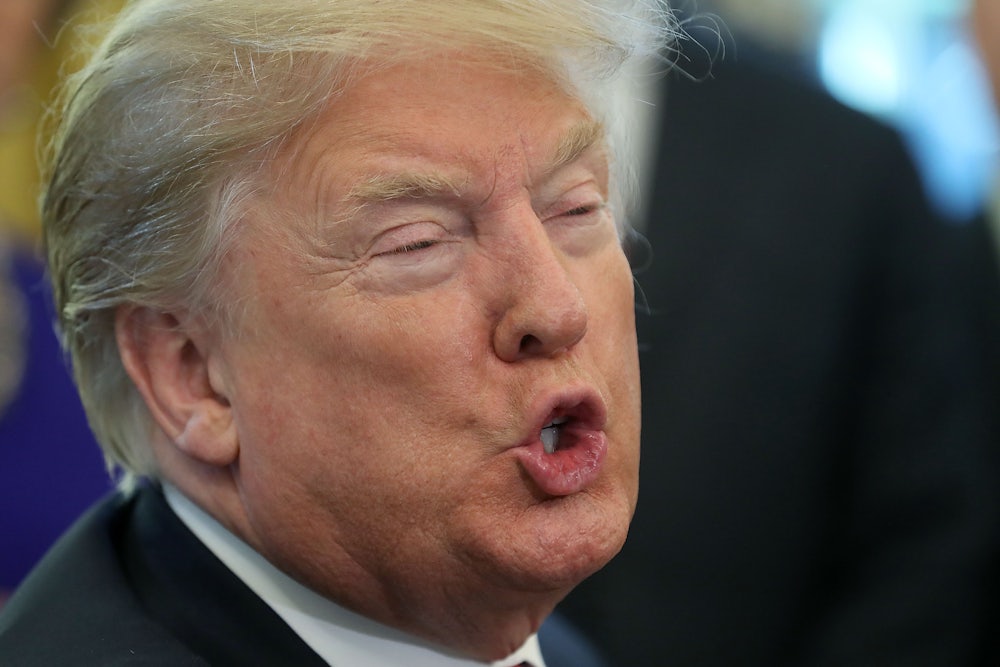President Donald Trump on Thursday sat down with two reporters from The New York Times and its publisher, Arthur Sulzberger, for one of his semi-regular Oval Office interviews with the newspaper. As is tradition, the Times published a transcript of their discussion. This time, however, they made the curious and revealing decision to publish it in two parts.
The first one is the usual fare. Trump undermines Republican negotiators by asserting they won’t get anywhere with congressional Democrats. He implicitly threatens to declare a national emergency to secure funding for his border wall. He rails against the Russia investigation, then claims Deputy Attorney General Rod Rosenstein assured his lawyers he’s not a target of it. And he opines on the qualities of his potential Democratic challenges in 2020.
The second transcript is unique—a meta-interview on Trump’s hostile relationship with American journalism. The president, who recently gloated over media layoffs, pleads ignorance about his attacks’ corrosive impact on American journalism, and he claims to support a free press. He just wishes he got the credit he believes he deserves for his perceived accomplishments. “I came from Jamaica, Queens, Jamaica Estates and I became president of the United States,” he tells the reporters. “I’m sort of entitled to a great story from my—just one—from my newspaper.”
This surreal conversation is a useful window into why Trump’s presidency is so unpredictable and self-destructive—and shows how the press continues to hold out an unreasonable hope that he can be reasoned with, let alone persuaded to change his mind. Throughout the back-and-forth, Trump alternates between an unusually conciliatory tone and his familiar self-aggrandizement. Sulzberger, who asks most of the questions in this transcript, adopts a deferential but persistent stance in defense of a free press. Trump’s responses are flat and atonal unless he’s criticizing an adversary or touting himself. It reads like some kind of ancient Greek tragedy where a group of local nobles tries to persuade a mad king against further destruction; both sides know nothing will change, yet both sides still pretend otherwise.
Sulzberger tells Trump that foreign governments have used his rhetoric about “fake news” to justify crackdowns on independent media outlets. “And so it’s not, you know, about viral, you know, viral stuff on Facebook,” he tells the president. “It’s about countries using that term to actually ban independent scrutiny of their actions.” There’s a brief glimmer of recognition from the president. “I don’t like that,” Trump replies. “I mean, I don’t like that.” But the moment is short-lived. “I don’t like [that], though I do think it’s very bad for a country when the news is not accurately portrayed,” he says. “I really do. And I do believe I’m a victim of that, honestly.”
When Trump then tries to pivot to his accomplishments with China, Sulzberger steers the discussion back toward the broader fallout of Trump’s attacks, even for journalists that don’t cover him at all. “Would you say more so now than over the last five years?” Trump asks. Yes, Sulzberger replies. “Right now?” the president asks. “I mean, more so now than even a year ago?” Yes, the Times’ publisher confirms. “I’m not happy to hear that,” Trump declares. He soon reverts to his grievances against “inaccurate reporting.”
Trump later defends himself by insisting he’s not alone in his critique of the Times. “I know what you’re all saying,” he explains, “but everybody thinks The New York Times treats me terribly. Washington Post also.” When the meeting wraps up, Trump tries to end on an upbeat and unbelievable note. “I mean, you know, anyway I agree with you 100 percent, and I’m honored to have spent the time with you, and I’d like you to call me, and I’m going to work on that so hard you have no idea,” he told the Times’ team. “Cause I think you’re right.”
It’d be nice to think that the president meant that. But past experience suggests otherwise. Delegitimizing media outlets is too valuable a tactic for him to give up so easily. In a tweet last May, Trump effectively admitted that he uses “fake news” as a general term to describe negative coverage of his administration. It works, too: A poll earlier that spring found that 89 percent of Republicans think major news outlets spread fake news. Trump’s slim road to reelection depends on holding together his base, which means he needs to inoculate as many of them as possible from the whirlwind of bad news that surrounds him.
Even if the president gained no strategic advantage from his attacks on the press, there’s no reason to believe he’d ever relent. This has nothing to do with his prodigious talent for lying and fabulism. It’s that he is often unable to stick to any particular stance, especially when pressed on it in person. Even his own party struggles with his mercurial nature. Last January, they scrambled to remind Trump that he opposed a clean DACA vote after California Senator Dianne Feinstein pressed him to support it on national television. Pressure from conservative commentators over border wall funding last December led Trump to renege on congressional Republicans and force a self-destructive government shutdown.
This is who Trump is, and there’s no changing him at this point. It’s clear that he lacks either the will or the desire to constrain many of his worst impulses, especially where the press is concerned. The evidence so far suggests that, if anything, he actively enjoys indulging in them. The Rosetta stone for his presidency isn’t The Art of the Deal or special counsel Robert Mueller’s eventual report. It’s a post on Twitter that he published in the late morning hours of November 19, 2012, three years before he ran for president: “It makes me feel so good to hit ‘sleazebags’ back—much better than seeing a psychiatrist (which I never have!)”
